| |
 |
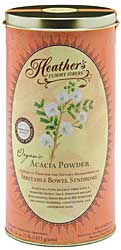
Organic Acacia
Soluble Fiber
The prebiotic fiber that relieves both diarrhea and constipation!
In this Issue...
Food & Recipes
Special Letters
Rx News & Research
Ask Heather
Did you miss the latest
IBS newsletter and
Wok-Steamed
Teriyaki Salmon?
Past issues
are posted here!
|
 |
|
| |
Heather's IBS Newsletter ~ For Irritable Bowel Syndrome
January 10, 2006
New Year and a New Column, plus IBS Diagnostic Criteria - When in Rome?
Hello to everyone -
This week we have a deliciously different (and super easy) Greek tuna sandwich recipe, which incorporates fennel seeds for help with gas and bloating. If you've only used whole fennel seeds for brewing tea, it will come as a wonderful surprise to see how beautifully this herb works in foods when it's freshly ground.
We also introduce the new year with a brand new column, featuring stories from readers. We receive so many wonderful letters from people about how they have learned to successfully manage their IBS that I decided to start sharing their stories in each newsletter. I hope they will inspire, encourage, and educate you to find the best ways possible to make 2006 the year that you overcome your own IBS.
As always, we've also got the latest IBS news and research. Enjoy!
Best Wishes,
Heather Van Vorous
Did a friend send you this newsletter? Sign up here for your own free subscription. 
Greek Tuna and Fennel Sandwiches
This is one of those special recipes where just a few simple ingredients come together in an exciting new way. Since each ingredient needs to shine, make sure you use high quality foods. White tuna will be more flavorful than pink tuna, fresh lemon juice is incomparably better than bottled, and freshly ground high volatile oil whole fennel seeds provide the deliciously Greek twist. The fennel is also very helpful for reducing bloating and gas, so this recipe is not just delicious but downright helpful for IBS.
These sandwiches come together in just minutes but give a whole new flavor variation to ordinary tuna!
Makes 3-4 Servings
One small can white albacore tuna in water, drained
1 T whole fennel seeds
1/2 t sea salt
grated zest (just the yellow part, grate using a cheese grater) of one lemon
1 T capers
juice of 1/2 lemon
2 t olive oil
small cucumber, peeled and very thinly sliced
3-4 pieces fresh white pita bread
Add the drained tuna to a small bowl and break up pieces with a fork. Grind the whole fennel seeds with the salt (you can use a blender, a mortar and pestle, or a spice grinder). Add the ground fennel and all remaining ingredients except cucumber and pita bread to the bowl, and blend together thoroughly. Taste and adjust amount of salt or fresh lemon juice to taste. Spoon tuna mix into pita bread, add a few cucumber slices, and enjoy!
Are you just learning how to eat for IBS? A little intimidated at the thought of special IBS recipes? Not quite sure just what makes these recipes special in the first place? Don't worry! Come see the IBS Diet pages, and find the answers to all your questions.
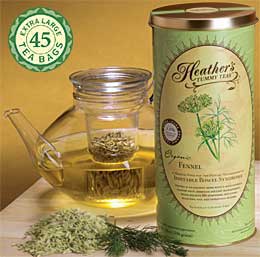  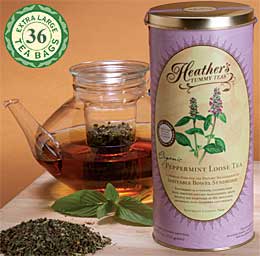
Fennel & Peppermint Tummy Teas - High Volatile Oil Content
Now in New Jumbo Organic Teabags!
Fennel is terrific for bloating & gas, Peppermint is great for IBS pain & spasms.
 New Year, New Column!
New Year, New Column!
I'd like to welcome everyone to 2006 with what should be a very encouraging and inspiring new column, featuring letters I receive from people with IBS. As regular readers of the IBS Newsletter are well aware, I've shared quite a few wonderful letters in the past, featuring everything from a teenager's long-term stabilization to Sammy the dog's amazing recovery.
It finally occurred to me (and yes, it took a while - sometimes I'm a little slow!) that we receive so many of these terrific stories I should be sharing them in every newsletter. So, here we go with our brand new column, which actually features two letters from Deborah George in Miami. Deborah, who not only had terrific news when she first wrote me, also had additional progress to report just one week later. May her story give you hope and encouragement for getting your own IBS symptoms under control in 2006, and getting your life back once and for all!
December 30, 2005 - Hi Heather! I just have to share with you my exciting news (and then I promise not to bother you any further)! I ran 8 miles this morning after a week break to give my colon a chance to restabilize. My colon was completely calm the entire distance, I never once had to dash behind a bush, and there was absolutely no diarrhea or loose stool. Because I have battled this IBS problem for nearly 2 years (this year in particular a horror of all horrors), I had forgotten what it was like to run without symptoms. I keep shaking my head at how simplistic the concepts for managing IBS are, yet, our top medical specialists are clueless. It makes no sense. I am so grateful to have stumbled on your website. By the way, your book and the Acacia arrived this morning. I canít wait to start reading!
Thank you again for sharing all your research, experiences, and information with the IBS population at large. I love your Peppermint Tummy Tea, it made giving up coffee very easy. The Peppermint Caps also work well. Iím very happy with every product I purchased from you. Iím equally excited about starting the Acacia, though I must tell you the Benefiber powder has served me well. Iím going to keep it in the office and use the Acacia powder at home.
Have a very happy 2006. I wish you and your husband every success with the IBS business you have created. You have much to be proud of Ė youíre helping so many individuals who have suffered unnecessarily. Why is the medical profession disinterested in learning about IBS and its management? ~ Deborah
January 4, 2006 - Hi Heather! I simply cannot get over the difference in my colon since readjusting my diet. In fact, it was easy for me since I have been a vegetarian for years. Dairy products have never been a part of my diet, nor has meat or fried foods. What I had to give up was my favorite treat Tostitos 1/3 fat taco chips, but I tried your suggested Frito Lays Baked Potato Chips and absolutely loved them (the Tostito Baked taco chips were too bland for my taste buds). Giving up coffee was the best thing I did for my colon. I was tired the first 3 days but after that my energy returned.
Oddly, years ago I had incorporated a rotational pattern of drinking coffee for one year, giving it up the next year and so on. I did this for about 10 years; several years ago I abandoned the practice. I also stopped eating whole wheat pancakes. I had no idea whole wheat was a trigger but looking back, I felt unsettled after eating my whole wheat homemade pancakes. Bread has never been a problem since my primary store bought bread is Ezekiel, and my homemade baked breads are either brown rice flour, corn flour, or a combination of millet and other grains. For this reason, I wasnít able to identify whole wheat as the culprit. Regarding alcohol (not that I drink much), I can drink red wine without any negative repercussions.
What I also learned from you was to cut my vegetables really small, to puree my black and red beans, and to peel my pears and other fruits. I have been making a peeled pear smoothie a few nights a week with Soy Silk Vanilla light Ė it doesnít disturb my colon at all and is a tasty dessert or after meal treat.
I like your concepts a lot, Heather, and I think about them as I prepare my meals. Iím extremely conscientious to have lots of soluble fiber before and with my insoluble fiber foods. My colon has never felt better. As for the Acacia, itís working well. I plan to buy it regularly from your website, along with the Peppermint Tea and Caps which I love.
So, thank you again. Iím planning to write my colo-rectal surgeon to share with him my discoveries. We work on the same medical campus at the University of Miami. He was very perplexed by my condition but didnít give any credence to the notion that perhaps I was suffering from IBS. I had brought the subject up with him but it was glossed over and dismissed. I believe IBS sufferers need to educate our medical professionals. The minimum they should have at their disposal are website references to offer ailing patients who, in turn, can gather information and do their own observational research.
Iím back to running long distance regularly without any problems. You were an answer to my prayers, Heather. Take care, Deborah
Thank you, Deborah, for sharing your story and surely giving hope to many other folks for the new year. Sometimes it truly is the small, simple changes that make the biggest difference! ~Heather
~ Heather's Tummy Fiber ~
For the Dietary Management of Abdominal Pain, Diarrhea, &, Constipation
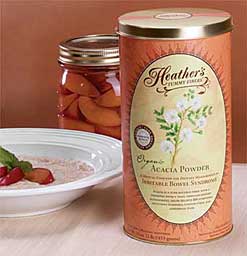
Organic Acacia ~ Pure Soluble Fiber
The prebiotic fiber that relieves both diarrhea and constipation!
 Heartburn Drugs Can Cause Diarrhea
Heartburn Drugs Can Cause Diarrhea
People taking proton pump inhibitors and H2 blockers have greater risk of infection from a potentially dangerous diarrhea bug known as Clostridium difficile, or C-diff, according to a recent study by researcher Sandra Dial, MD, MSc, of McGill University in Montreal, in The Journal of the American Medical Association.
Proton pump inhibitors include Prilosec, Prevacid, and Nexium among others. H2 blockers include drugs such as Zantac, Pepcid, and Tagamet. These are the main medications offered to people suffering from stomach acid problems such as gastritis, GERD (acid reflux disease), or heartburn. They work to suppress stomach acid production which helps to alleviate discomfort.
Clostridium difficile is prevalent in the environment and especially in hospitals and nursing homes. Spores from C-diff enter our bodies through the mouth, which is the entryway for the gastrointestinal tract. Diarrhea caused by C-diff is a result of overgrowth of the C-diff bacteria in the colon, or large intestine. It has generally been associated with antibiotic use, which can kill "good" bacteria in the colon which keeps C-diff at bay.
"Clostridium-difficile-associated disease is becoming an important public health issue," writes Dial. Gastric (stomach) acid operates as a major defense mechanism against ingested bugs. But when people take gastric acid suppressors the stomach's normal acidity is lost, and this defense mechanism may become diminished, she explains.
Go here for more information about this study...
Possible Role of Nitric Oxide in Visceral Hypersensitivity in IBS
A recent article in Neurogastroenterology and Motility noted that visceral hypersensitivity is a consistent finding in a considerable proportion of patients with irritable bowel syndrome (IBS), and may provide a physiological basis for the development of IBS symptoms. In this study, they aimed to confirm the hypothesis that nitric oxide (NO) is involved in maintaining visceral hypersensitivity in IBS. The study found that, although NO does not seem to play a major role in normal rectal sensation or tone, there is evidence that NO may be involved in the pathophysiology of visceral hypersensitivity in IBS.
Go here for more information about this study...
Survey on Patient Educational Needs in IBS
A recent Journal of Clinical Gastroenterology study aimed to determine the educational needs of IBS patients, regarding content, presentation format, and expectations from healthcare providers.
The typical response profile included: interest in learning disease management and preference for information presented in person by an M.D. Choice of presentation media included magazines, television, and Web sites. Doctors' qualities ranked high related to competency, allocation of sufficient time, and listening skills. This qualitative study will provide pilot data for a national survey on the educational needs of IBS patients, for use in developing effective patient-centered, educational programs.
Go here for more information about this study...
Carbonated Soft Drinks, GERD, and Risk of Esophageal Cancer
Carbonated soft drinks (CSDs) have been associated with gastroesophageal reflux, an established risk factor for esophageal adenocarcinoma. As both CSD consumption and esophageal adenocarcinoma incidence have sharply increased in recent decades, a recent Journal of the National Cancer Institute examined CSD as a risk factor for esophageal and gastric cancers.
High CSD consumption did not increase risk of any esophageal or gastric cancer subtype in men or women or when analyses were restricted to nonproxy interviews. These findings indicate that CSD consumption (especially diet CSD) is inversely associated with risk of esophageal adenocarcinoma, and thus it is not likely to have contributed to the rising incidence rates.
Go here for more information about this study...
Looking for more IBS research and news? Check the IBS Research Library!
~ Heather's Tummy Tamers ~For the Dietary Management of Abdominal Pain &, Bloating
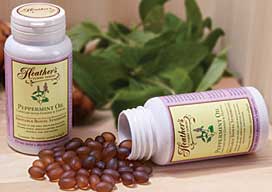
Peppermint Oil Caps with Fennel and Ginger Are Amazing!
Because our Peppermint Oil Caps have the added benefits of fennel and ginger oils, they are truly unbeatable for preventing abdominal pain, gas, and bloating!
 IBS Diagnostic Criteria - When in Rome? IBS Diagnostic Criteria - When in Rome?
Recent "Ask Heather" columns have featured current medical definitions and exclusions for a diagnosis of Irritable Bowel Syndrome. I've noted red flag symptoms, given an explanation of what, exactly, IBS is, and addressed illnesses that are frequently mis-diagnosed as IBS. As a part of these columns, I've mentioned the Rome II Criteria, which are the formal medical guidelines used to accurately diagnosis IBS. However, I've gotten a lot of questions from people about what, exactly the Rome II Criteria are, and how to know whether or not their own IBS symptoms match.
The Rome II Criteria, also known as the Rome II Guidelines, are the codified diagnostic criteria that formally defined IBS as a physical - not psychological - disorder that affects mainly the bowel, that is characterized by lower abdominal pain or discomfort in association with diarrhea, constipation (or alternating diarrhea/constipation), gas, bloating, and nausea. These guidelines define IBS not as a disease, but as a functional disorder, and specifically as a syndrome (by definition, a syndrome is a collection of symptoms).
It's a critical point that IBS is not a disease. This means that an IBS diagnosis depends in part on determing whether or not your symptoms match those that have been medically established as definitive of Irritable Bowel Syndrome. This is exactly where the Rome II Criteria come in - they are the current standard for this definition.
So what, exactly, are these criteria? Here we go....
The Rome II diagnostic criteria of Irritable Bowel Syndrome always presumes the absence of a structural or biochemical explanation for the symptoms and is made only by a physician.
Primary Symptoms:
Irritable Bowel Syndrome can be diagnosed based on at least 12 weeks (which need not be consecutive) in the preceding 12 months, of abdominal discomfort or pain that has two out of three of these features:
1. Relieved with defecation; and/or
2. Onset associated with a change in frequency of stool; and/or
3. Onset associated with a change in form (appearance) of stool.
Secondary Symptoms that Cumulatively Support the Diagnosis of IBS:
1. Abnormal stool frequency (may be defined as greater than 3 bowel movements per day and less than 3 bowel movements per week);
2. Abnormal stool form (lumpy/hard or loose/watery stool);
3. Abnormal stool passage (straining, urgency, or feeling of incomplete evacuation);
4. Passage of mucus;
5. Bloating or feeling of abdominal distension.
Additional Supportive Symptoms of IBS:
1. Fewer than three bowel movements a week
2. More than three bowel movements a day
3. Hard or lumpy stools
4. Loose (mushy) or watery stools
5. Straining during a bowel movement
6. Urgency (having to rush to have a bowel movement)
7. Feeling of incomplete bowel movement
8. Passing mucus (white material) during a bowel movement
9. Abdominal fullness, bloating, or swelling
Please note that the presence of abdominal pain or discomfort is a necessity. Bowel dysfunction, whether diarrhea or constipation, that occurs without pain, cannot be diagnosed as IBS according to these criteria.
Once you have a firm IBS diagnosis that falls in line with the Rome II Criteria, take heart. While there is no cure yet, there are many ways to successfully manage - and often prevent - all IBS symptoms. Check the overview of treatments for IBS so you can begin to to control your IBS, not vice versa.
~ Heather
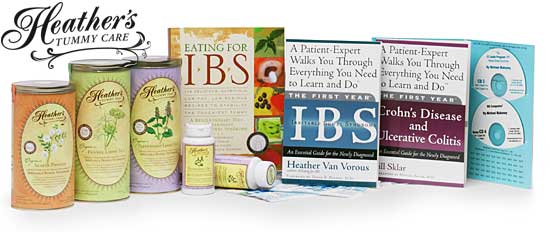
Shop at Heather's Tummy Store for IBS
HelpForIBS.com
The only store that's just for IBS - so we only carry the very best

You are receiving this email because you have expressed interest in IBS news and information.
Change your newsletter email address here.
If you are viewing this newsletter on a website and would like to subscribe for email delivery, please "Join the IBS Newsletter" here.
ANTI-SPAM PRIVACY & SECURITY POLICY
HelpForIBS.com
Heather's Tummy Care
80 S. Washington St, #304
Seattle, WA 98104 USA
© 2006 Heather Van Vorous, Heather's Tummy Care. All rights reserved.
|
|
| |